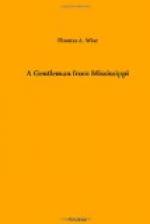The junior Senator from Mississippi burst into the office with his habitual cheery greeting, his broad-brimmed black felt hat in its usual position on the back of his head, like a symbol of undying defiance.
“A busy day for us, eh, Senator?” queried Bud.
“Now, look here, my boy, don’t begin to remind me of work right off,” he said, with a humorous gleam in his eye. “Go easy on me. Don’t forget I’m her father.”
Bud laughed through the flush that rose in his cheeks.
“No, I won’t forget that. But have you decided what to tell Peabody and Stevens as your plan of action if they come in here at 12:30?”
“If they come?” exclaimed Langdon. “They’ll come. Watch ’em.”
Then he hesitated, worriedly.
“I’ll have to incubate an idea between now and noon, somehow. But don’t forget this, Bud—we’re worried about them, true enough, but they’re worried a heap more about us.”
Senator Langdon stepped into an adjoining room, where he could be alone, to “incubate.”
As Haines resumed his work Carolina Langdon entered.
Avoiding the secretary’s direct gaze, she asked for her father.
“He ought to be back shortly, Miss Langdon,” responded Haines. “You can wait here. I must ask pardon for leaving, as I must run over to the library.”
As the secretary bowed himself out of the door he almost collided with Congressman Norton. Both glared at each other and remained silent.
“Carolina,” spoke Norton, as he entered, “I hope—I know you won’t allow your father to influence you against me—because of last night. I—”
Carolina would rather not have met Charles Norton on this morning. She had hardly slept for the night. She had fought a battle with herself. Her father had shown her plainly the mistake she had made. She saw that her influence had not been without effect on Randolph. Probably for the first time she realized that there are glory and luxury, pleasure and prestige for which too big a price can be paid.
The Senator’s daughter turned slowly and faced the man she had promised to marry.
“Charlie, I have come to a decision. I came here to talk with father about it.”
Norton started toward Carolina, a look of apprehension on his face. He gathered from the trend of her words and her demeanor that she had turned against him.
“You couldn’t be so cruel, Carolina,” he protested.
“Charlie,” she went on, determinedly, “I will always cherish our friendship, our happy younger days down in Mississippi, but, I must give up thinking of you as my future husband. We’ve both made a mistake, mine probably greater than yours, but I now am convinced that I should not marry you. Your way of thinking about life is all wrong, and you are too deeply entangled with the dishonest men in Washington to draw back. I cannot love you.”
“But I am doing it all for your sake, Carolina. Don’t let an old-fashioned father come between a man and a woman and their love,” he cried.




